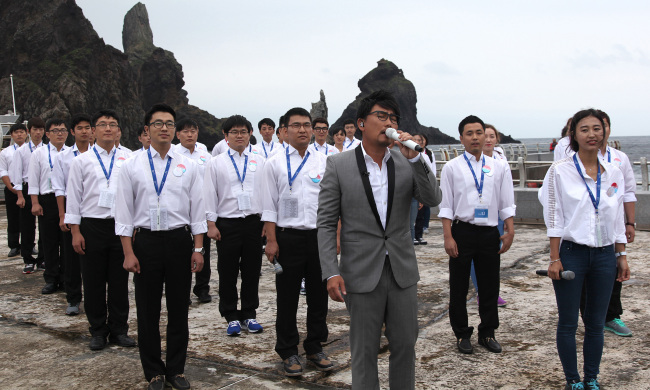Singer Lee Seung-chul was denied entry to Japan on Sunday in an apparent retaliation for a performance on the easternmost Korean islets of Dokdo in August.
The singer performed on the islet on Aug. 14, a day before the 69th anniversary of Korea’s liberation from Japanese colonial rule. Lee sang a song with a choir of young North Korean defectors.
The Korean Ministry of Foreign Affairs expressed regret over Lee’s entry refusal on Tuesday.
“It’s regrettable for a Korean national to have been reportedly refused entry into Japan for dubious reasons,” said Noh Kwang-il, a spokesman of the Korean Foreign Ministry, in a news briefing.
He said the South Korean Embassy in Japan requested reasons for Lee’s entry denial, but Japan declined to provide a reason, citing the protection of privacy and customary procedure.
 |
Singer Lee Seung-chul (center, front row) sings “That Day” with a choir of North Korean defectors, a song which expresses the desire for Korean reunification, on Aug. 14 on the easternmost islets of Dokdo. (Yonhap) |
In 2011, the K-pop boy bands Beast and CNBLUE were held at the immigration office for eight hours and returned to Korea when tension regarding the territorial issue of Dokdo between Korea and Japan was at its highest.
Actor Song Il-gook was denied entry to the country in 2012, following his participation in a swimming event near Dokdo to publicize Korea’s sovereignty over the islets. Singer Jeong Gwang-tae who sang a popular Dokdo song “Dokdo is Our Land” was denied a visa by Japan in 1996 on his TV production trip. He was the only one to be refused the visa in the team of broadcasting crew.
Japanese officials have allegedly cited unspecified reasons to explain their decision to reject entry of the Korean celebrities.
According to Lee’s agency, an immigration official allegedly mentioned unspecified recent media reports about him, but declined to clarify the source. The official also declined to explain the reason Lee’s wife is also being held together and denied to entry. Lee visited Japan at his Japanese acquaintance invitation.
When Lee said he would make an official complaint, the Japanese official brought up Lee’s past record of smoking marijuana 20 years ago. The agency hit back that Lee had never been banned from the country although he visited Japan 15 times after he was caught smoking marijuana.
“The entry denial appears to be a retaliatory measure against Lee’s performance of a song about inter-Korean reunification on Dokdo in August and ensuing domestic news reports about the event,” the agency said.
When Song was informed by Vice Minister of Foreign Affairs Tsuyoshi Yamaguchi that, he would be denied entry to Japan, he responded on social media, saying “I would just name my sons ‘Daehan, Minguk, Manse’” ― a Korean phrase meaning “long live Korea.” He has triplet sons whose names together spell out the phrase.
Lee said he would fight against the decision by the Japanese officials.
“If my right to (proclaim Dokdo as) my country is the reason they used to forbid my entry to Japan, I would not sit still, but fight against them even if I would be denied re-entry,” Lee said.
By Lee Woo-young (
wylee@heraldcorp.com)
